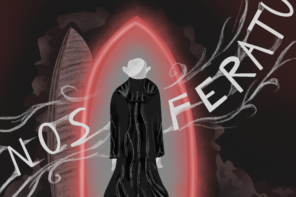Six p.m. struck, and there I sat, sunken in my seat, popcorn in hand. Straight ahead, the massive screen glared back at me, with its ever-growing presence encapsulating each audience member. As the lights dimmed, silence conquered the room. Excitement rushed through my body in anticipation of Damien Chezelle’s most recent film, Babylon.
After just five minutes, Chezelle’s magical abilities, which had been previously executed in La La Land and Whiplash, kicked in. As my eyes widened, consuming every glimmer of the screen, Chezelle transported me to a vulgar world of chaos, excess, and even horror. Babylon‘s first act immerses you inside a rapturous 1920s Hollywood party, surrounded by exotic animals and equally wild stars. Justin Hurwitz’s soundtrack creates an ecstatic atmosphere, enhanced by the theatre’s high-quality loudspeaker, through which every sound vibration reverberates through your body. Babylon’s characters’ compulsion to dance is palpable.
This scene is where we are first introduced to the film’s key protagonists: Manny Torres (Diego Calva) and Nellie LaRoy (Margot Robbie) are both outsiders, consumed by an ambition to enter the Hollywood scene due to their love of cinema. Jack Conrad (Brad Pitt), on the other hand, is already an insider as a successful silent film star. Nonetheless, Babylon does not constrain itself to these three protagonists, as its ensemble cast plays a prominent role in unveiling the various dynamics present in Hollywood. Most notably, Lady Fay Zhu (Li Jun Li) and Sidney Palmer (Jovan Adepo) reflect the constraints faced by minority identities in show business.
We are so engrossed in the elated atmosphere that thirty minutes feels like five.
As a three-hour film, this party sequence comprises thirty minutes of it, yet the accelerated pace at which it is composed inhibits the comprehension of this time. We are so engrossed in the elated atmosphere that thirty minutes feels like five.
To the surprise of many viewers, this extravagance is rapidly interrupted as the film progresses. With the introduction of talkies, Babylon presents morbid themes that reflect the struggles of the protagonists as they navigate changes in the industry. The film nevertheless retains its escapist qualities by exhibiting even its dark sequences in exaggerated and comedic terms. As an audience member, these moments enhanced the cinematic experience, as emotions of horror, laughter, and anguish fluttered across the theatre room, shared between the community of audience members.
While the theatre where I saw Babylon was filled, not all audiences of the film were this fortunate. Grossing a disappointing $4.85 million at the U.S. box office during its opening four-day weekend, many theatres found themselves empty. This can largely be attributed to the film’s marketing failure, specifically its lack of exposure; the little publicity released solely depicted the film as another straightforward glamorization of Hollywood. Moreover, Babylon’s release was overshadowed by Avatar: The Way of Water, which debuted the same weekend.
Critics also contributed to Babylon’s negative exposure, assigning the film a Rotten Tomatoes score of only 56 percent. Much of the criticism resides in the film’s disorderly form, which is reinforced by its seemingly gratuitous and grotesque moments. However, Babylon’s structure contributes to its reflection of the world’s chaos. The sensation of, at times, feeling lost in the storyline aligns with the characters’ frantic attempts to navigate Hollywood themselves. Our nauseating reactions to some of the film’s sequences forebode the horrors underlining the industry. For example, the addition of Tobey Maguire’s character, James Mckay, terrorizes us as the diabolical figure guiding the characters’ descent into Hollywood’s hell.
The sensation of, at times, feeling lost in the storyline aligns with the characters’ frantic attempts to navigate Hollywood themselves.
Despite having knowledge of Babylon’s low ratings and yet no clue of its actual premise, I chose to go to the cinema to uncover the film for myself. Babylon is a film made for the big screen. It thematically discusses the brilliance of cinema through its impassioned final dialogue, revealing the eternity of film while praising the greatness of the cinematic experience itself. It simultaneously confirms these ideas through its formal features, which assure the film’s magic by immersing you in this distant yet realistic world. As Chezelle himself describes, Babylon is a “poison pen hate letter to Hollywood,” yet a “love letter to cinema.” Consequently, audiences are left conflicted, with a brewing passion for film but a fear for the industry that produces such greatness.
Babylon is the perfect escape, a sensation only accentuated by the atmosphere of the movie theatre itself. It reminded me that we must return to the cinema, not only for remakes and sequels that confirm our expectations, but to engage with the unknown. Regardless of whether the film ends up being abhorrent or spectacular, it nonetheless has the potential to arouse a spectrum of emotions within audiences. Even when unleashed into a reality similar to your own, escapism persists. Real-life challenges are approached through various perspectives, proposing alternate solutions or encouraging new forms of reflection. Even the most depressing films can provide a sense of hope.
Audiences are left conflicted, with a brewing passion for film but a fear for the industry that produces such greatness.
After being entrapped in our homes for so long due to COVID-19 and becoming increasingly reliant on the confines of our small screens, the cinema provides a return to a sense of community; it silences the notifications of our daily lives and unites us with strangers in the current moment, synchronizing our heartbeats as they reflect our erratic emotions.
While the long durations and ticket costs can be a turn-off to this experience, alternatives exist. For example, catch the Tuesday discounts at Cineplex, or engage with the McGill community itself via the Peel Street Cinema.








